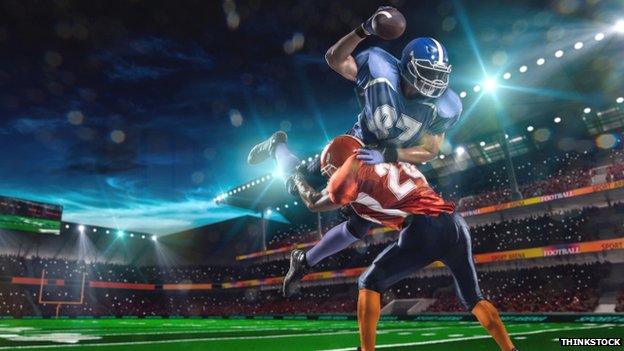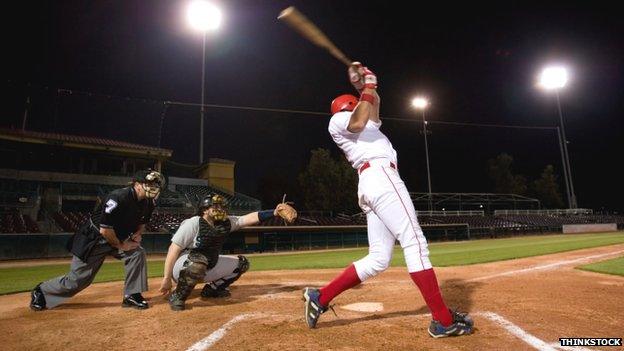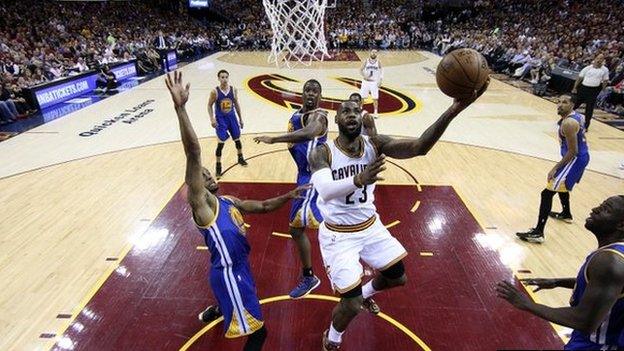FanDuel plays in the big leagues
- Published

If your fantasy is to create a billion dollar business, why not create it out of fantasy?
That's what Nigel and Lesley Eccles have done as co-founders at FanDuel.
It's a storming success that's grown out of Edinburgh University. Alongside Skyscanner, the travel search site, it's the big consumer hope for the Scottish tech sector.
Yet few have heard of it close to home. All its customers are in the USA and Canada, and that's where they've been for the six years since it started.
Online users play daily and weekly fantasy sports, across American football, baseball, basketball and ice-hockey.
They can be in public leagues, or playing with friends, and pay stakes proportionate to the prizes.
The idea is to research players in your chosen league, using the wealth of data in US sports, building up a team with the constrained budget you've been set. That research and choice of team is what is deemed to make this a game of skill.
Then the real players take to the field, and you score points depending on how well the real players do, when their efforts are awarded to your fantasy team.

FanDuel has sponsored partnerships with 13 professional basketball league teams and 16 American football teams, and is official partner of the National Basketball Association. So it's a brand that's getting well known in the nation's sports stadiums and its sports websites.
Giveaways
There are reckoned to be more than 40 million players of fantasy sports online in North America. FanDuel leads the field in daily plays. By last year, it had hit a million regular active users. Since last summer, the number of active users was up four-fold.
One measure of engagement by users is the number of edits and entries they put into their gaming profiles, and that can run to 200 per second.
When I last went to its modest Edinburgh base 20 months ago, one of the things that struck me was that it didn't measure its success by profit (it wasn't making any), but by how much it gives away in prizes.
In 2012, it had given away a $50m (£32m), which seemed quite a lot for a small team in an Edinburgh office block. In 2013, they were on track to give away $135m (£87m).
But since I last checked, it's moved into swankier surroundings and that number has grown somewhat. Last year, the prize fund totalled $560m (£360m), and this year - get this - they intend to give away more than $2bn. That's £1.3bn. And a rough rule of thumb is that for every £9 given away in prizes, £1 is taken as revenue.

American dream
FanDuel had already had to put its corporate brass plate into the US, as it needs to keep on-side with lobbying and regulation. And its customer base likes to be all-American with those World Series of theirs.
It was a loophole in 2006 US legislation that gave FanDuel the space to grow, by exempting online fantasy sports from gambling law.
But it still retains its roots in Scotland. The company is recruiting staff for its Edinburgh Quartermile office, and opening a Glasgow city centre base next month. By the end of this year, FanDuel expects to have 90 employees in Scotland, and 160 in the US.
It has offices in New York and Los Angeles, and recently set up a Florida development site with 40 staff, working on all things online sport and gaming.
Branding clout
With that kind of growth, it's no surprise that others are moving into the same fantasy sports field.
Its main rival is DraftKing. Yahoo has vast online sports communities, but is only now getting into the lucrative daily play market. Sports channel ESPN has its branding clout behind this too. Nigel Eccles expresses surprise that they have been so slow to spot what FanDuel has been doing, and to move in to that turf.
The New York Times recently reported analyst estimates that the daily play market is worth $2.6bn in revenue, and will rise at 41% per year to reach $14bn by the end of the decade.
The key to future success in keeping a share of that market is partly to keep the offer fresh. FanDuel has to motivate its young team to stay sharp. With daily plays and the ability to change your fantasy team regularly, it keeps people coming back frequently.
The vital challenge is to keep attracting, or "acquiring", users. That's where much of the $363m (£233m) of recently-raised capital is to go.
FanDuel has just announced the final part of that package, with investments totalling $275m (£176m). That is from some of the blue chip investors of the US tech scene, led by Kohlberg Kravis Roberts and including investment arms of Google, NBC, Time Warner and the Disney family.
It's easy for marketers to find sports fans, but not cheap to advertise to them. The rewards, though, can be impressive. Not many online websites can claim more than eight hours of eyeball time per month.
- Published14 July 2015
